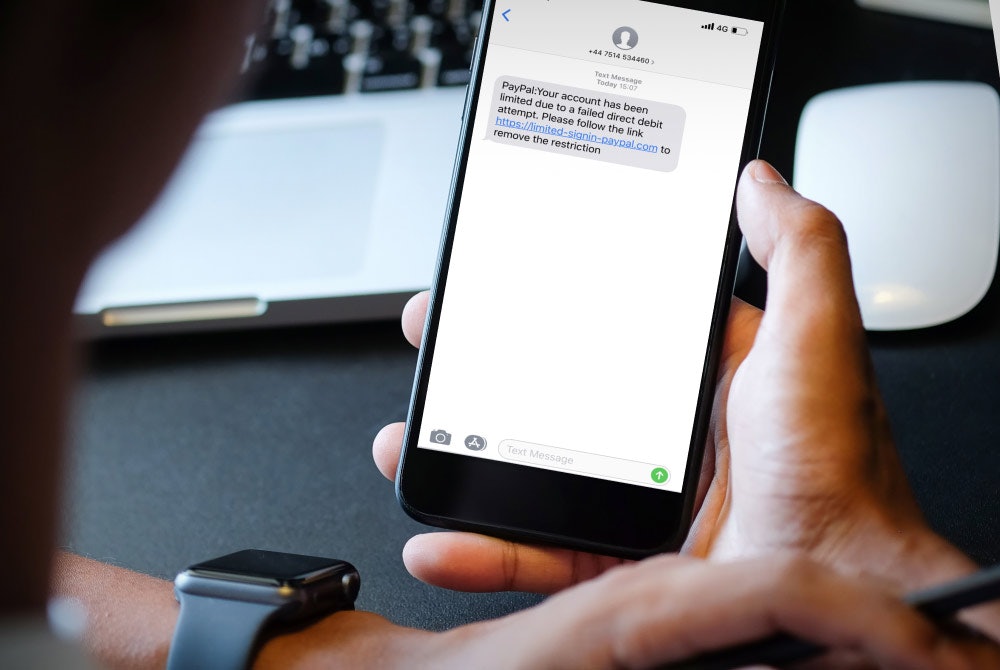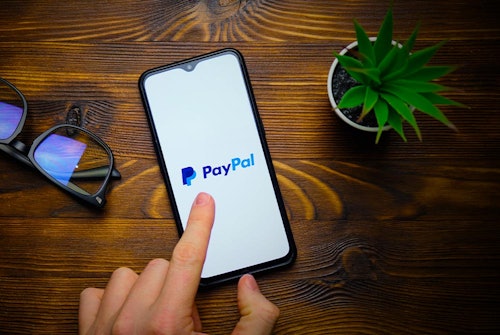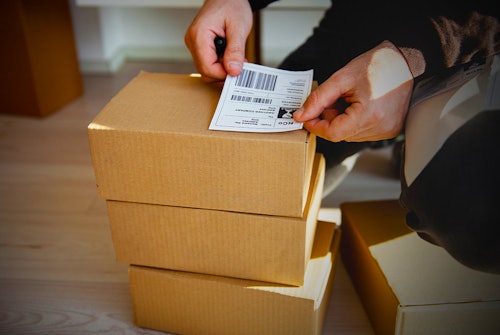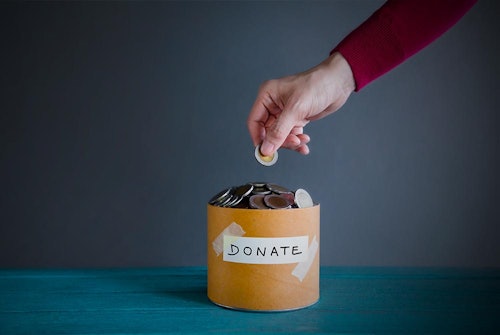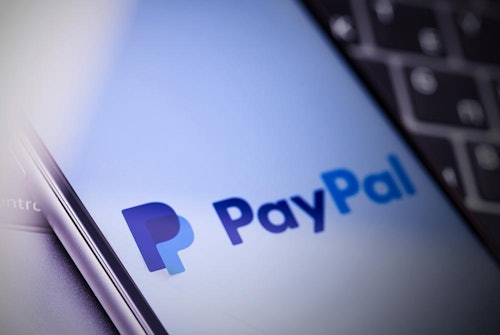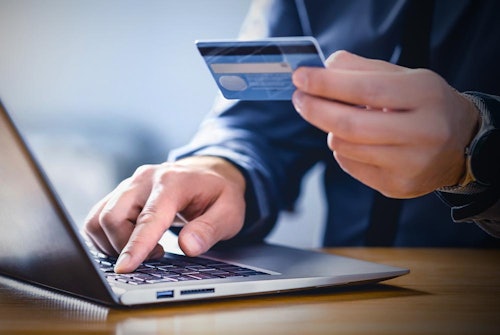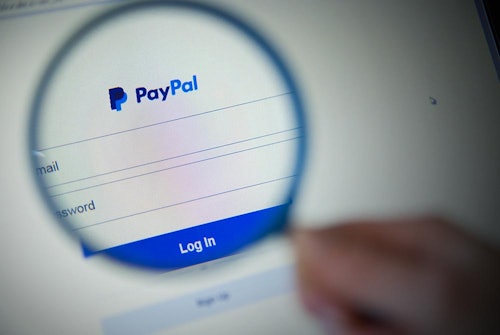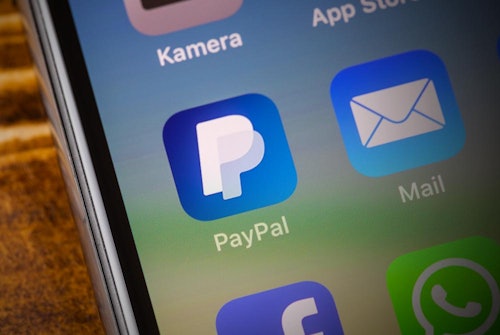PayPal In Depth
- Types of Scams Targeting PayPal Customers
- Most Common Types of PayPal Scams
- How to Beat PayPal Scams
- Protection for PayPal Customers
PayPal's profoundly financial nature has made the company all too tempting for hackers and scammers to trick unsuspecting users. Unfortunately, PayPal scams are all too common, especially since its platform has more than 244 million users.
It is one of the most impersonated brands by scammers, along with Facebook, Netflix, and Microsoft.
What is PayPal?
PayPal is a money-transferring service. It essentially acts as a middleman, allowing you to send funds directly from your bank account to other individuals or registered companies without either party having to reveal personal bank account information. It also works in reverse, allowing businesses to accept these same types of payments from customers. In return, PayPal collects a fee off of certain transactions.
As one of the original online money-transferring services, PayPal has grown to become one of the most popular of these services globally. The ability to transfer money back and forth between international accounts through the platform is one feature that has made PayPal so ubiquitous.
More Than Just a Money Transfer Service
Over the years, however, PayPal has steadily expanded its services. Besides paying out people or businesses directly, customers today can also extend a line of PayPal credit (purchasing something through the company and paying for it later, in increments, at a relatively steep interest rate). And contractors can also use the service to create and facilitate invoices, with the company handling the lion’s share of the tricky tax information.
It's important to verify links and contact details to beat imposters.
Types of Scams Targeting PayPal Customers
Services like PayPal have made so many aspects of modern life more convenient, whether it’s paying a friend or family member back for some borrowed money or having a faster and easier way to purchase goods and services from an online retailer.
But its ties to such sensitive information as bank account numbers and other transactional data have made PayPal scams all the more common among imposters and scammers.
It’s important to remember: For every bit of convenience the site provides, you should take care to act with equal parts caution.
Most PayPal scams come in the form of messages impersonating the company. This allows scammers to ask for information that could allow them to hack into your PayPal account directly or possibly even infiltrate your bank account.
How PayPal Contacts You
A message from PayPal will always address you by your first and last name, never by "Dear User," or "Dear [your email address]." If an email looks suspicious, it’s best to report it to PayPal then delete it.
But many also attempt smaller-scale scams perpetrated by beating businesses out on details like payment or shipping options. Of course, this works both ways, with some scammers posing as sellers, collecting payments but never actually delivering the promised goods.
Generally, there are two main ways scammers try to intrude into PayPal customers’ lives: by sending fake emails and fake payments.
PayPal Scam Emails
PayPal scam emails are arguably the most widespread scam to look out for when dealing with the company. By and large, these are emails supposedly sent from the company, and they will almost always ask for your personal information in one way or another. (The email may ask you directly for details or include a link you’re meant to click on.)
If the email does include a link, it’s important to never click on it. Enter “www.paypal.com” into a different web browser instead.
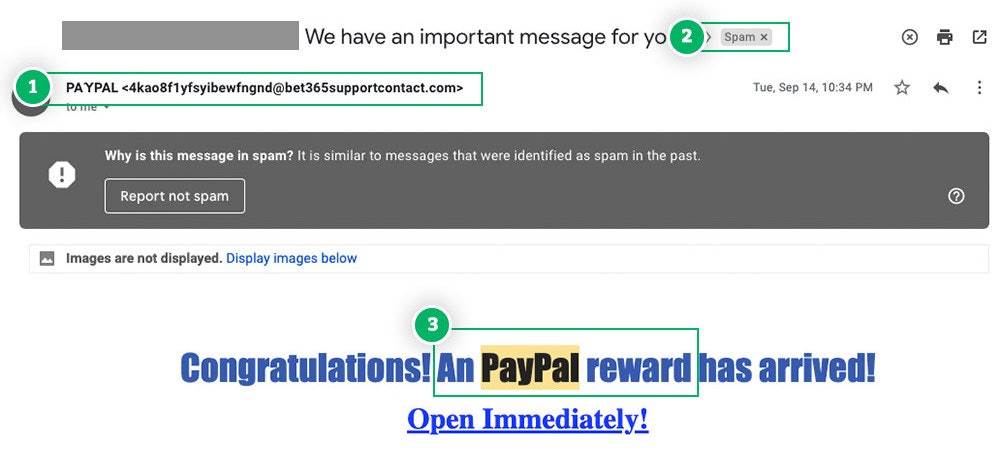
It’s also imperative to never give out identifying details—including your address, birth date, and especially your password or any specific account numbers—in response to an email. The company itself says it will never ask for your bank account, credit card information, or password via email.
PayPal Scams Involving Payment
Another class of common PayPal scams includes those dealing with shipping and payment information.
These mainly target businesses that offer PayPal payments as an option. Scammers posing as customers will try to get their goods for free—or at least try to get some money back—through a variety of tricks, including alleging they’ve already paid for their product or that they’ve overpaid.
Scammers May Use Reputable Companies to Trick You
Scams that impersonate other brands may also bring PayPal into the mix. For example, a Venmo phishing email scam tricks victims into believe there is a large sum of money waiting to be sent to them via PayPal.
Most Common Types of PayPal Scams
A few types of PayPal email scams are particularly prevalent—and, unfortunately, continue to be quite effective.
When using PayPal, whether as a buyer, seller, or for a money transfer between friends, make sure to stay wary of these types of scams.
The “Too Good to Be True” Email
Several PayPal scam emails fall into this category, including messages informing you that you:
- Have become the beneficiary of an inheritance
- Have won the lottery or some other type of contest
- Are owed payment
It may sound great—and oh so tempting—to believe that you’ve suddenly come across a bundle of money that you never knew previously existed. But try to push past the temptation to see the truth: These things hardly, if ever, actually happen.
Most of the time, these emails will ask you to make a small payment (via PayPal) to facilitate the money transfer. Sometimes they’ll also include forms to fill out with personal data.
Aside from the apparent “too good to be true” signs, red flags to look out for include lousy grammar and questionable return email addresses.
The “Account Error”
Another popular form of a PayPal email scam includes an urgent message sent to you, supposedly from the company, to alert you to some issue with your PayPal account.
Many times, these include links to send you to a site to “fix the problem.” They can send you to a site that looks very much like PayPal, but be wary of the domain name—it will be slightly different.
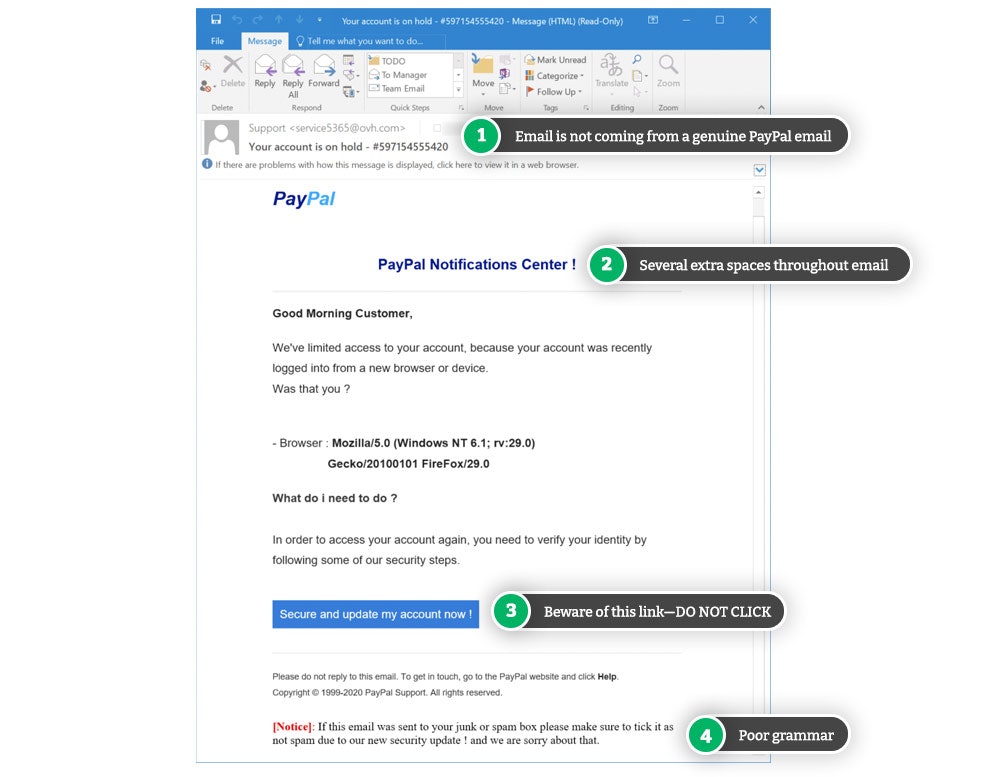
However, the best route is to never click on the links at all.
They can easily download spy software or other viral information onto your device, or the sites they lead you to could be feeding your information directly to the scammers. Instead, access your PayPal account by typing in the PayPal URL directly into your web browser.
Other times, the scammers will ask for sensitive information, including your account password or bank account number. It is imperative to never give out such information over email. Remember: PayPal will never ask you for your bank account, credit card number, or password via email.
The Overpayment or Shipping Address Swap
Primarily impacting those who sell items and use PayPal to collect payments, these types of scams supposedly come from—or are on behalf of—customers.
The simplest version of this involves a customer claiming that they’ve overpaid for a product and asking for the difference back. (The easiest solution to this is to cancel the transaction entirely and start fresh, rather than refund anything.)
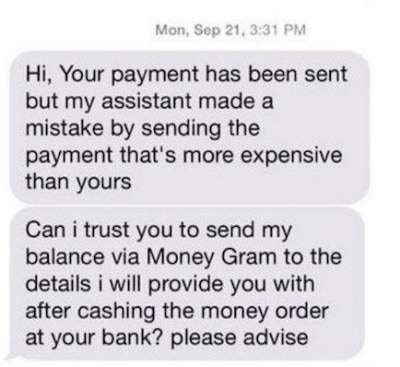
Sometimes, scammers will send an email, making it appear as they’ve already paid you in an attempt to coerce you into rushing out a delivery.
And sometimes, the scam involves a delivery address bait-and-switch. The scammer will provide the wrong delivery information, then file a complaint after several failed delivery attempts (and finally “correct” the shipping address) to get the product for free, with a complaint filed against you, as the seller, to boot.
How to Beat PayPal Scams
To ensure you’re not scammed by someone impersonating PayPal, it’s important to remember the following:
- Legitimate emails from PayPal will come from an @paypal.com email address. Scammers may try to trick you by having their name as “PayPal Customer Service,” but their email address will not be from an @paypal.com account.
- Emails from PayPal will address you as your first name and last name, or the business name associated with your account—they will never address you as “Customer” or something non-personal like that.
- PayPal will never ask for information like your password or bank account information via email.
- PayPal will never send you any attachments via email or request that you download or install any software.
Double-Check Where The Email is Coming From
Remember, if there’s anything fishy about an email you received from PayPal, don’t click any of the links.
The safest thing to do is access your PayPal account by typing in “paypal.com” directly into your web browser. This way, you know you’re visiting the real PayPal site and not a fake link sent to you by a scammer.
Protection for PayPal Customers
Thankfully, PayPal has several ways to deal with these types of scams or any other fraudulent or suspicious activity you may notice on your PayPal account.
Report Scams to PayPal
If you’ve been the recipient of—or think you’ve received—a PayPal email scam, the best thing to do is report the email directly to PayPal. Forward the email to [email protected], where the company will evaluate the message. Then, once it’s been forwarded, delete it from your inbox.
PayPal Resolution Center
PayPal also offers a Resolution Center where you can make individual claims or disputes about specific payment activities, including money you sent and money you received. Simply sign in to your PayPal account to access the Resolution Center.
The Resolution Center handles most fraud-based inquiries, but if you don’t find what you’re looking for there, you can send a secure message to PayPal while logged into your account.
PayPal Security Notifications
PayPal will send you an email notification if your account is changed—including a password change—or the company detects what it perceives to be unusual account activity, such as signing in from a unique location or device.
If you receive one of these notifications but don’t remember taking the action in question, it could be a sign that your account has been hacked. Here's what to do next:
- Sign in to your account as quickly as you can and change your password as well as your security questions
- Double-check your account information to ensure they haven't changed your info, including your:
- Email address
- Billing and physical address
- Phone number
- Report the issue to PayPal’s Resolution Center
Scams Impacting PayPal
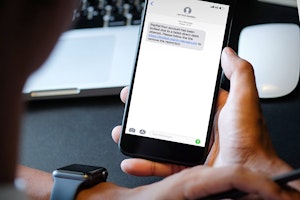
PayPal Text Scam: Identify a Fake & Protect Your Money
Several versions of fake PayPal text messages are being sent to people worldwide. There are a few easy ways to tell which messages are scams and simple things you can do to protect yourself.
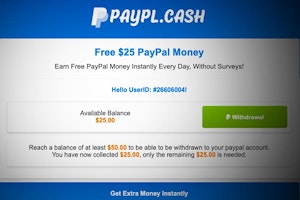
Free PayPal Money Scams: Don't Believe the Hype, It's a Scam
Multiple free money scams that easily fall under the “too good to be true” scams that target loyal PayPal users with promises of free PayPal money.

How to Avoid PayPal Shipping Label Scams: Top Tips
PayPal is a convenient way to pay for online purchases and has a reputation for safety and security. But scammers still find a way to use PayPal to help them steal products.

PayPal Shipping Scams: Tips to Protect Your Money and Items
Scammers take advantage of PayPal's buyer protection program to scam sellers out of their money and items for sale.
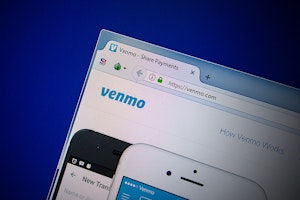
Venmo Email Scams: Red Flags & How to Beat Them
Venmo users are noticing suspicious emails hitting their inboxes with claims of a large sum of money waiting to be transferred by a PayPal user.
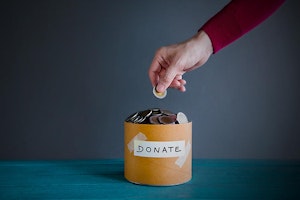
PayPal Charity Scams: Scammers Use Fake Charities to Rob You
These scams target those who want give back, preying on your generous nature to scam you out of your money.
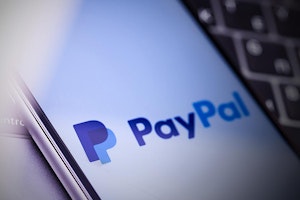
Imposters Steal Your Information in PayPal Phishing Scam
Beware of fake PayPal emails and text messages that ask you to verify your account—this is a scam.
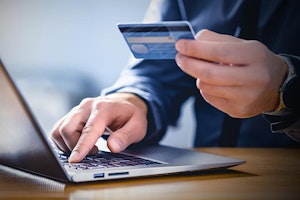
Overpaid on a Craigslist Sale? You May Be Involved in a Scam
Getting more money than you've asked for may seem great, but it could actually be part of a scam to steal your money.
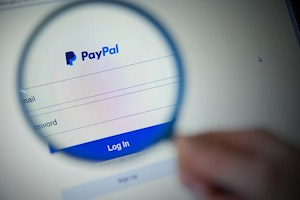
Craigslist PayPal Scam: Signs of This Scam To Watch Out For
If a buyer on Craigslist insists on only using PayPal to transfer money to you, be careful not to click on any links that they send you or you receive via email from PayPal.
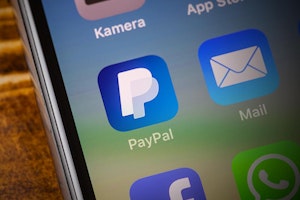
PayPal Overpayment Scam: Tips to Prevent Being Scammed
In this scam, people sending payment via PayPal send more than you've requested, but you end up being the one to lose money.
Guides To Protect Against Banking & Finance Scams
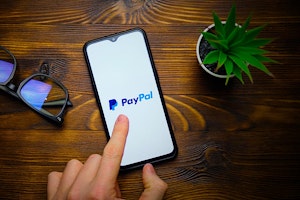
How to Beat PayPal Scams and Keep Your Money Safe and Secure
Whether you use PayPal for personal use or business transactions, scammers are out to get you. It's what you know and how you act that will keep your money safe.
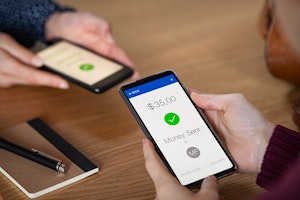
Protect Your Funds: 6 Safe Ways to Send Money in the U.S.
Nowadays, there are many options for quick peer-to-peer money transfers. Here are six safe ways to send electronic funds via mobile payment apps.

5 Holiday Scams Waiting to Steal Your Joy This Season
Whether you donate to a charity this season or buy your family a new puppy, scammers are eagerly waiting to trick you into giving up your personal information in these holiday scams.

PayPal Protection for Buyers and Sellers: Keeping You Safe
The great thing about using PayPal when buying or selling things is that you're (for the most part) protected from fraud and scammers.

Beat Cash App Scams and Stay Safe When Transferring Money
Cash App may be a convenient way to send and receive money from friends and family, but it's also a common target for scammers who are out for your money.
News About Banking & Finance Scams

Banks May Refund More Zelle Scam Victims in 2023
Zelle scams have reached a serious volume. New reports suggest that banks are looking at new refund protections for customers in 2023.
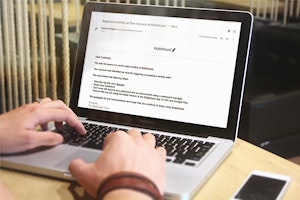
RobinHood Customers Are About to Be Phished—Here's What it Will Look Like (Examples)
Robinhood's latest data breach of 5 million email addresses means that Robinhood users are about to encounter a wave of phishing attempts.
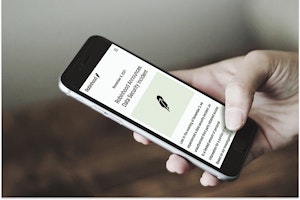
Robinhood Users: Look Out for Scams Following Data Breach
Robinhood recently suffered a massive data breach, exposing the information of millions of users.

Urgent CDC Warning: Eye Drops Linked to 3 Deaths, Loss of Vision
The CDC is warning eye drops users of a rare bacterial infection from 2 brands of eye drops. The infection is resistant to antibiotics and has resulted in the loss of vision, loss of eyeballs and the death of 3 patients.

Optus Data Breach - One of the Worst Cyberattacks in Australia
Hackers have gained access to 9.8 million customer records from Optus in Australia, exposing personal information such as driver licence, medicare and passport details.
